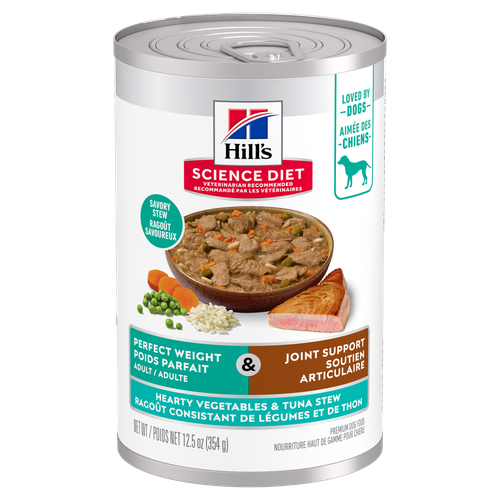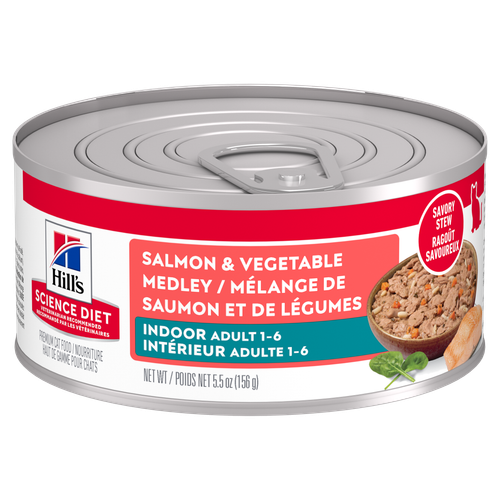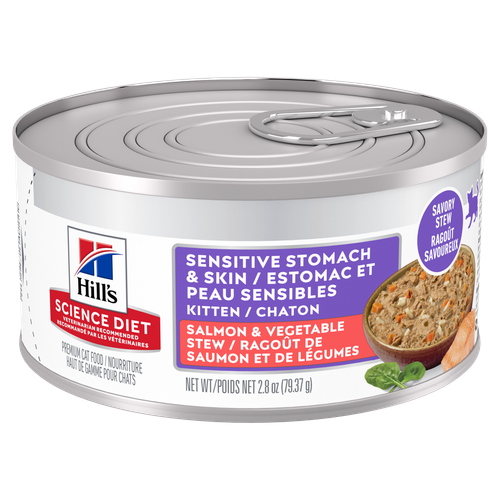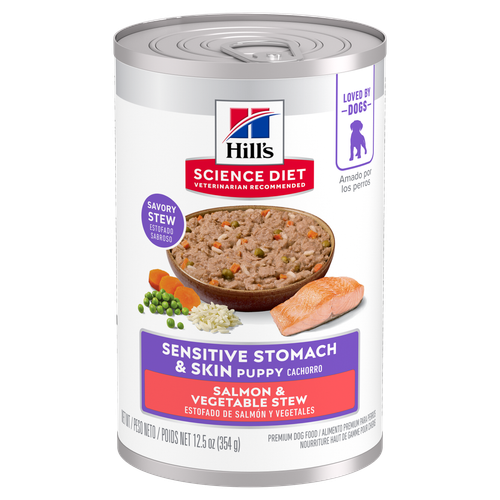
-
Find the right food for your petTake this quiz to see which food may be the best for your furry friend.Find the right food for your petTake this quiz to see which food may be the best for your furry friend.Featured products
 Adult Perfect Weight & Joint Support Hearty Vegetables and Tuna Stew Dog FoodShop Now
Adult Perfect Weight & Joint Support Hearty Vegetables and Tuna Stew Dog FoodShop Now Sensitive Stomach & Skin, assortiment de conserves
Sensitive Stomach & Skin, assortiment de conservesHill's Science Diet Sensitive Stomach & Skin Variety Pack
Shop Now Healthy Cuisine, Adulte, assortiment de conserves
Healthy Cuisine, Adulte, assortiment de conservesHill's Science Diet Healthy Cuisine Variety Pack
Shop NowFeatured products Adult Urinary Hairball Control Savory Chicken Entrée cat food
Adult Urinary Hairball Control Savory Chicken Entrée cat foodSupports the health of the whole urinary system with optimal levels of magnesium
Shop Now Adult Indoor Salmon & Vegetable Medley Cat Food
Adult Indoor Salmon & Vegetable Medley Cat FoodPrecisely balanced nutrition for indoor cats with the delicious taste of savory salmon and vegetables
Shop Now Kitten Sensitive Stomach & Skin Salmon & Vegetable Stew
Kitten Sensitive Stomach & Skin Salmon & Vegetable StewSupports kitten growth, digestive health, nourishes skin and promotes a lustrous fur
Shop Now -
Dog
- Dog Tips & Articles
-
Health Category
- Weight
- Food & Environmental Sensitivities
- Urinary
- Digestive
- Joint
- Kidney
- Dental
- Cancer
-
Life Stage
- Puppy Nutrition
- Adult Nutrition
- Senior Nutrition
Cat- Cat Tips & Articles
-
Health Category
- Weight
- Skin & Food Sensitivities
- Urinary
- Digestive
- Kidney
- Dental
- Stress
- Cancer
-
Life Stage
- Kitten Nutrition
- Adult Nutrition
Featured articles Compare Your Pet Food's Calories to Other Brands
Compare Your Pet Food's Calories to Other BrandsCompare Hill's Science Diet dog and cat food's calories against other pet food brands and AAFCO recommended maximum calorie count.
Read More Pet Food Storage Tips
Pet Food Storage TipsDiscover how and where to store your dry, as well as canned, dog and cat food. Learn how to find the "best before" dates on all Hill's pet food packaging.
Read More The Incredible Science Behind Your Pet's Microbiome
The Incredible Science Behind Your Pet's MicrobiomeLearn what a pet's microbiome is, how it contributes to your pet's gut & overall health, and why nutrition is important in maintaining healthy microbiomes.
Read More -


Blind dogs and cats make terrific pets. While they require a little extra attention than pets without visual difficulties, being a good pet parent to a blind dog or cat is easier than you might think. If you're considering adopting a blind dog or adopting a blind cat, here's what you need to know.
Blind Dogs and Cats

Some pets are born blind, while others lose their eyesight as the result of an injury or health condition. Health conditions tend to be the more common cause, which can include pets losing their vision due to age-related conditions, like cataracts or macular degeneration, or illnesses such as glaucoma or progressive retinal atrophy, says The Spruce Pets.
Unfortunately, many pets wind up in shelters after losing their vision due to the mistaken belief that blindness will make them too difficult to care for. But the truth is that dogs and cats are highly adaptable animals and often learn quickly to live with their vision loss. They're generally as easy to care for as any other pet. Don't be deterred from adopting a blind dog or adopting a blind cat — they could make a great addition to your family.
What to Know Before Adopting a Blind Dog or Cat
Before adopting any pet, it's important to ask questions that will help you determine whether the pet will be a good fit for your household and whether you can provide the care they need to thrive. In addition to the standard questions to ask before adopting a dog or cat, here are some additional questions to ask:
- What caused the vision loss and will it require treatment? You should know whether your new pet will require specialized veterinary care, how much it will cost and if you can afford to provide it.
- Does the pet have partial vision and, if so, will it worsen? Some types of vision loss worsen over time. But it's also possible that the pet's vision could stabilize without resulting in total blindness.
- Does the pet know any special commands? Many pet parents of blind dogs find it helpful for their dogs to know commands such as "wait" or "up" so they can better navigate their environment.
- How well does the pet adapt to change? Knowing the degree to which a pet might become stressed out by change will help you know whether your home will be an agreeable environment for them.
- Is there anything that stresses the pet out or makes them nervous? Even resilient pets have their quirks and might become nervous around certain sounds, smells or textures. Knowing what stresses out your new pet can help you prepare your home to be more welcoming.
Shelter workers will also do their best to ask you questions about your ability to care for a blind pet. They want to ensure that this pet is right for your family as much as you are right for this pet. Answer their questions as truthfully as you can because it is necessary to be honest with yourself to determine if you can care for any pet, not just one that is blind.

Preparing Your Home for a Blind Pet
It's a good idea to prepare your house ahead of time before bringing your new pet home. Blind Dog Rescue Alliance recommends the following steps to get your home ready for adopting a blind dog or cat:
- Get down on the pet's level and go through your home and yard, looking for potential hazards. Remove items that might cause your pet to stumble. Use bubble wrap or foam padding to soften sharp edges on furniture, and trim back any branches or bushes that could potentially cause injury. Use pet-safe scented sprays to mark things your pet might bump into — but be sure to avoid using essential oils as many are toxic to pets, especially to cats.
- Using baby gates, block off the tops of staircases, balconies and other areas that could pose falling hazards. On outdoor decks or porches with railings wide enough for your new pet to fall through, line the rails with chicken wire or trellis panels so your blind pet can enjoy these outdoor spaces without any danger of walking off the side.
- Place different textures around the house and yard to help your pet find their way. For example, place a rug under food and water bowls, so they can feel they're in the right place. A rug or textured stepping stones in front of steps leading up into the house will help notify a blind pet that it's time to step up.
- Think carefully about the placement of things like food and water dishes, pet beds, crates and litter boxes. These will serve as reference points that will help orient your pet to their location in the house. Once your pet learns where these things are, avoid moving them. If you must move something, lead your pet to the new location to show them where it is and, if necessary, pad sharp corners again until they learn the new layout.
- Leave a trail of dry pet food throughout the house to help your pet find their way with their nose as they explore their new home.


Tasty Tips
Young pets may need several visits in their first year for vaccinations. Adult pets generally benefit from annual check-ups, while senior or special-needs pets might require more frequent visits.
Living With a Blind Pet
Once they've learned the layout of your home, chances are your pet will get around it with little difficulty. But here are a few more things you can do to make life easier for you and your blind pet:
- Place bells on other pets, if you have any, so that your blind pet won't be startled by them. Wearing a bell yourself will also make it easier for them to find you. If your pet is small enough to get underfoot without you noticing, have them wear a bell as well. Since they can't see to get out of your way, this will make it easier for you to avoid stepping on them.
- Supervise them going up and down the stairs until it becomes second nature for them. Even then, block off the tops of staircases for safety.
- Use clicker training to train your pet. If they don't already know commands like "watch," "wait" or "step," these can be useful in helping them navigate their surroundings.
- If you don't already have one, consider adopting a sighted dog or cat to serve as a companion for your blind pet. Even without any special training, pets who see often naturally take to helping blind pets learn their way around and avoid danger.
- Consider crate training your blind pet if they'll be left alone for long periods of time or confine them to a small space when you leave.
- Provide noise-making toys that they'll be able to easily find or give them treat-dispensing toys that they can find by smell.
- Talk to your pet to reassure them of your presence and help them know where you are. Speak to them as you approach or before you pick them up so you don't startle them.
- Catster recommends that if you carry your pet to another spot in the house, be sure to set them back down at an established reference point, such as their litter box or bed, so they can reorient themselves to their new location.
- Don't allow your blind pet outdoors unsupervised. Be sure to keep exterior doors and windows shut and to block off access to balconies.
- Provide a safe spot in each room where your pet can escape from unwanted attention or noise, suggests The Spruce.
With a little extra TLC, blind pets can happily thrive and bring untold amounts of joy to your life.


Jean Marie Bauhaus is a pet parent, pet blogger, and novelist from Tulsa, Oklahoma, where she usually writes under the supervision of a lapful of fur babies.
Related products


Hill's Science Diet Sensitive Stomach & Skin Variety Pack

Hill's Science Diet Healthy Cuisine Variety Pack

Gentle on stomachs while nourishing skin & supporting development in growing puppies
Related articles

Learn what a pet's microbiome is, how it contributes to your pet's gut & overall health, and why nutrition is important in maintaining healthy microbiomes.

Learn why nutrients like antioxidants & amino acids can help improve your pet's immune system, as well as top antioxidants to look for in pet food.

Discover how and where to store your dry, as well as canned, dog and cat food. Learn how to find the "best before" dates on all Hill's pet food packaging.

Compare Hill's Science Diet dog and cat food's calories against other pet food brands and AAFCO recommended maximum calorie count.

Put your pet on a diet without them knowing
Our low calorie formula helps you control your pet's weight. It's packed with high-quality protein for building lean muscles, and made with purposeful ingredients for a flavorful, nutritious meal. Clinically proven antioxidants, Vitamin C+E, help promote a healthy immune system.
Put your pet on a diet without them knowing
Our low calorie formula helps you control your pet's weight. It's packed with high-quality protein for building lean muscles, and made with purposeful ingredients for a flavorful, nutritious meal. Clinically proven antioxidants, Vitamin C+E, help promote a healthy immune system.

